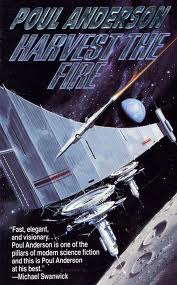More rhyming dialogue, missed earlier, in Poul Anderson's A Midsummer Tempest (London, 1975):
" 'Climb down to earth, now; do not seek to flee. I've longer legs than you, 'tis plain to see.' "
and, immediately below that:
" 'I reckon here's where we change trains, my loard'...'A moment, pray. I'll further look inboard.' " (p. 76)
- and that is followed by rhymes that I did quote earlier. I might find a few more before I finish rereading. But the main point is that much of the dialogue is prose disguised as verse, most of it not rhyming but "blank." If I may re-arrange an earlier exchange, on pages 12-14:
"Your Highness, cast your melancholy off,
"You'll find enjoyment and surcease from strife.
"The household staff and others you may meet
"Are under oath to breathe no word of you,
"And known to me for their trustworthiness.
"And thus, by day, though guarded, wander free
"About these grounds. I dare not let you ride.
"I would I did. I'm eager in the hunt,
"And you will like my horses and my hounds.
"But you can fish, play ball, do what you wish.
"I hear you are of philosophic bent.
"Well so am I. Make use of any books.
"Do you play chess? I'm not so bad at that.
"At night, I fear, you must be locked away
"In your apartment, high in yonder tower.
"But 'twill be furnished with the tools of art -
"They say you draw and etch delightfully -
"And you'll have access likewise to the roof.
"There often I beguile a sleepless night
"By tracking moon and stars across the sky.
"Come too! I'll show you mysteries in heaven
"And maybe they'll convert you to the truth."
"That lies not in your sour and canting creed."
"Were you not raised a Calvinist, my lord?"
"I try to be a proper Protestant,
"Yet not cast off what's good from olden time.
"I'd lifer hear a service that a rant;
"I do not think my Romish friends are damned,
"Nor that 'tis right to persecute the Jews;
"I'd hang no helpless granny for a witch.
"That day we captured Lichfield, I was glad
"To let its staunch defenders leave with honours.
"But when we entered the cathedral close
"And saw what desolation had been wrought
"On ancient lovely halidoms - Enough."
"There goes a daybreak wide across the world,
"Which causes pretty stars to flee our sight.
"But oh, those stars were shining infamous
"Within that chamber which a tyrant kept.
"'Tis pity that you fight for fading night."
"I grant that James was not the best of kings -"
"He was the worst...and followed Gloriana.
"Harsh taxes to maintain a wastrel court,
"Oppression of a rising merchant class
"In whom the seeds of England's greatness lie,
"And rural rule by backward-looking squires:
"Such was the legacy that Charles disowned not.
"And worse, his Queen herself is Catholic;
"The Papists get an easy tolerance;
"The Church of England stays unpurified.
"Small wonder, then, that free-souled men demand,
"Through Parliament, long-overdue reform."
"I am no judge of that - I'm merely loyal.
"And yet - you people prate so much of freedom -
"How free are they? No lord looks after them.
"You're free to let them go in beggary
"Across the gashed and smoky land you'd make."
"I thought your Highness a philosopher
"Who also cultivates mechanic arts."
"Well, that I do. I like a good machine."
"What think you of our late-invented cars
"Which run by steam and draw a train behind?"
"They've been too rare for me to more than glimpse,
"And railway builders all seem Puritan.
"We captured one such...locomotive, is it?
"Near Shrewsbury, upon that single line
"That leads into the West. I did admire it,
"But had no time from war to really look."
"I love them as I do my hunting horses.
"The morrow is the truest freight they bear.
"To date, they are but small, as well as few,
"Scarce faster than a beast although untiring.
"They mainly carry wagon loads of coal
"To feed the hungry engines in the mills
"And manufacturies of cloth and hardware
"Which men like me are building ever more of -
"You may not understand what we are doing
"From such few glimpses as you got by chance.
"But you - but men now live who'll see the day
"When this whole island is enwebbed with rails
"And locomotives like Behemoth's self
"Haul every freight, plus civil passengers,
"And troops, and guns in time of war - a day
"When power does not grow from birth or sword
"But out of mills and furnaces."
On antisemitism, mentioned here, I have read, but would need to confirm, that Cromwell welcomed Jews to England and that some Jews investigated his ancestry to see if he might be the Messiah.





































